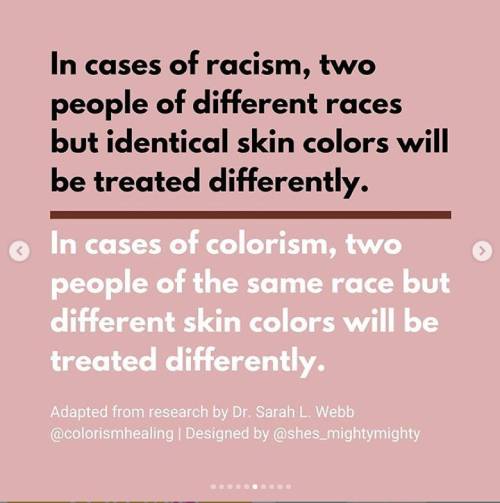Colorism Has Real Life Impacts on Millions
Apr 27, 2022
Colorism is treating people within a race or ethnic group differently based on the color of their skin. The person with the bias can be part of the same group or not. It’s often rooted in colonialism - accepting European standards of beauty as the norm and prioritizing white-adjacent beauty standards over Black and brown beauty.
The National Conference for Community and Justice provides a brief definition of colorism with support for the history.

Light skin, straight hair, and light eyes are associated with intelligence, beauty, wealth, power, access, and acceptance. Look at the images in the media – advertising, the news, movies and tv shows, music videos. Scientific studies of behavior, criminal sentencing, professional and economic opportunity, as well as thinking and perception support what we can notice in our own lives if we're brave enough to pay attention.
Colorism isn’t just an American thing. It’s global and its impacts are felt by dark-skinned people around the world:
Companies are cashing in. The makeup industry promotes skin lightening creams, raking in billions of dollars each year – almost $5 billion in 2017, despite the dangers associated with the chemicals and the failure of so many products to actually change skin color. A World Health Organization study found that 40% of Chinese women regularly use skin-lightening creams. That number is 61% in India and 77% in Nigeria.
One study showed gaps in career opportunities for light and dark-skinned women in India.
Studies show gaps in sentencing between light-skinned and dark-skinned people convicted of the same crimes when controlling for type of offense, socioeconomic status, and demographic indicators. In a 2011 North Carolina study, light-skinned Black women received more lenient sentences and spent less time behind bars. A Harvard study of nearly 67,000 male first-time felony offenders’ sentences found that medium and dark-skinned Black men received sentences 2.7% longer (about a year and a half) than light-skinned and white men.
Several studies have shown that white people in general associate lighter skin with intelligence and education…to the point that less educated but lighter skinned Black and brown folks receive more opportunities and in one study, white participants remembered more educated Black people as lighter than they actually are.
Activists have successfully pushed global cosmetics companies to take a few skin lightening products off the market, but we need to challenge our tendency to judge who people are based on the something as arbitrary as skin color. This takes a self-awareness that can be scary to most of us. It can also feel overwhelming and futile, like what good will it do for one person to be aware and change their thinking?
But if you’re brave enough to try, I can help you create the capacity to do the work with self-care and joy. Instead of turning away from core issues that create inequality, we can work together to examine and transform them. Check out my online community Inspired by Indigo and learn how to make antiracism a habit with support, guidance, compassion, and accountability.
Ready to DO something right now? Download the Everyday Activism Action Pack and get started today.
We hate SPAM. We will never sell your information for any reason.

